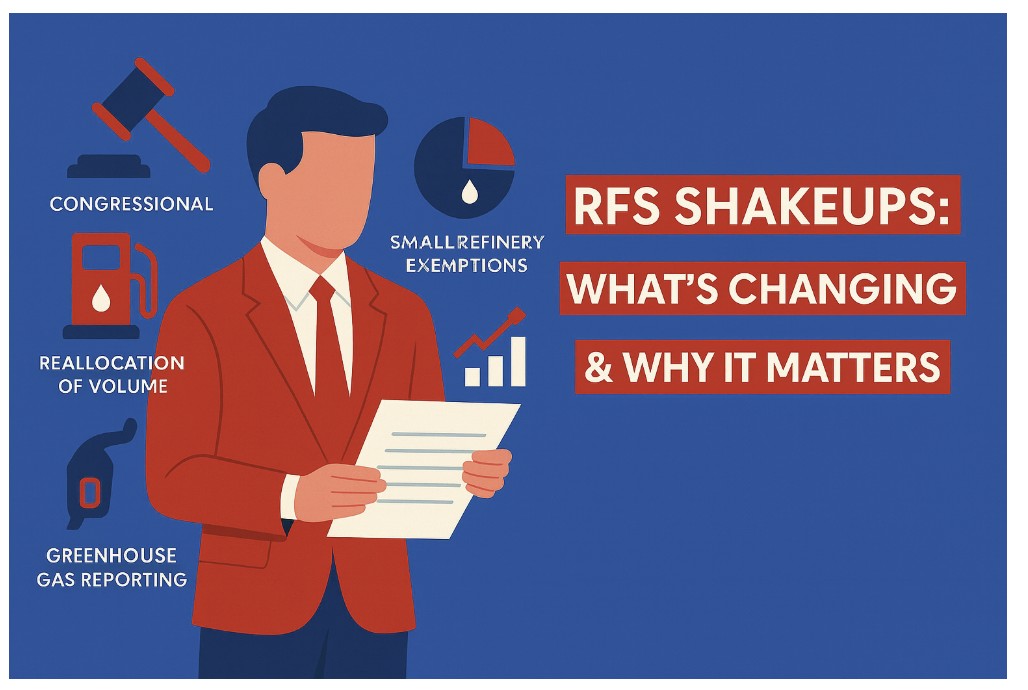The past two weeks have been eventful in the RFS space. Recent actions by the EPA, Congress, industry coalitions, and advocacy groups are attempting to reshape how the RFS is applied, especially regarding waivers, blended volume requirements, and reporting obligations. Here at RINSTAR, we’ve put together a news roundup from the past two weeks to keep you informed.
Major Developments
Reallocating Waived RFS Volumes (Small Refinery Exemptions / SREs)
On September 16th, 2025, the EPA announced a Supplemental Notice of Proposed Rulemaking (SNPRM) regarding the proposed reallocation options for biofuel blending obligations that were waived under the most recent approved small refinery exemptions. The EPA is considering full reallocation, partial (50%), or other proportions. In addition, the EPA is considering how to account for projected SREs expected to be granted in 2025 as part of its ongoing RFS rulemaking. The notice also provides further details on how EPA’s SRE projections will factor into the calculation of the 2026 and 2027 percentage standards.
The EPA will hold a virtual-only public hearing on October 1, 2025 for the proposed rule. All attendees, including non-speakers, must register by September 24, 2025 by emailing RFS-Hearing@epa.gov (one registration per person). Verbal testimony is limited to three minutes per speaker; no graphics may be shared. Preferred speaking times can be requested during registration and will be considered on a first-come, first-served basis. For questions or accommodations, contact Nick Parsons at RFS-Hearing@epa.gov.
Some in the biofuel industry are cautiously optimistic, seeing this as a path toward restoring lost RIN demand. “While we continue to question whether any SREs for 2023-2025 are truly justified in the first place, we are encouraged that EPA is proposing to add the exempted volumes back to future RFS requirements for 2026 and 2027,” said Geoff Cooper, president and CEO of the RFA.
Congressional Moves to Block Reallocation
While some in the biofuel industry are cautiously optimistic, others are calling for limits or protections so that obligated parties aren’t overburdened. Lawmakers including Sen. Mike Lee has introduced legislation aimed at preventing the EPA from reallocating SRE-waived RFS volumes, to reduce the proposed RVOs, and to block full reallocation to minimize compliance burdens on refiners and to mitigate market disruptions.
Reduced 2024 Cellulosic RVO & Legal Pushback
On June 13, 2025, the EPA released two major updates to the RFS program, including a finalized adjustment to the 2024 cellulosic waiver.
This partial waiver has prompted lawsuits from the RNG Coalition and the American Fuel & Petrochemical Manufacturers (AFPM) On September 4, the RNG Coalition filed a lawsuit in the U.S. Court of Appeals for the District of Columbia Circuit challenging the July 7 rule. The American Fuel & Petrochemical Manufacturers (AFPM) submitted a similar challenge the following day. On September 8, the court consolidated both cases, with detailed filings from each party expected in early October.
Greenhouse Gas (GHG) Reporting Program Likely to be Rolled Back
On September 12, the EPA issued a proposed rule to eliminate the Greenhouse Gas Reporting Program. If finalized, it would lift reporting requirements for most large facilities, fuel and industrial gas suppliers, and CO₂ injection sites.
Supporters argue that many requirements are bureaucratic burdens with limited environmental benefit. While critics warn that removing reporting obligations could reduce transparency, make regulatory oversight more difficult, and obscure the true scale of industrial emissions. Jessie Stolark, Executive Director of the Carbon Capture Coalition, stated “Today’s announcement from the US Environmental Protection Agency (EPA) regarding the repeal of certain subparts of the Greenhouse Gas Reporting Program (GHGRP) will not advance carbon storage – something EPA Administrator Zeldin has publicly supported,” and “By canceling subparts of the GHGRP that are inextricably linked to the election of the federal Section 45Q tax credit, this proposed rule endangers billions of dollars in investments from American businesses in these technologies.”
How RINSTAR Helps You Stay Ahead
If you’re navigating these policy changes, whether you’re generating RINs, obligated to comply, or just trying to stay informed, RINSTAR can help. From timely updates on rulemaking to detailed insights about RFS compliance, our team tracks the latest developments so you don’t have to. Reach out to learn how RINSTAR can support your strategy in this shifting regulatory environment.
Stay Informed
The EPA’s latest proposals, including reallocation of waived SREs, revisions to 2024 cellulosic RVOs, a potential rollback of greenhouse gas reporting, and new standards for 2026 and 2027, show how quickly Renewable Fuel Standard policies can shift.
To keep your business prepared, subscribe to our newsletter and follow our blog for timely updates on:
- Supplemental EPA rulemakings and SRE policy developments
- Legal and legislative challenges shaping RFS implementation
- Carbon intensity scoring and GREET model updates
- Renewable fuel tax credits and compliance strategies
Have questions about how these changes may impact your compliance obligations?
📩 Contact us at services@cfch.com or schedule a personalized RINSTAR demo today.

